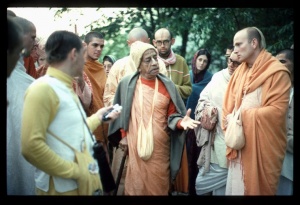SB 3.21.16

A.C. Bhaktivedanta Swami Prabhupada
TEXT 16
- prajāpates te vacasādhīśa tantyā
- lokaḥ kilāyaṁ kāma-hato 'nubaddhaḥ
- ahaṁ ca lokānugato vahāmi
- baliṁ ca śuklānimiṣāya tubhyam
SYNONYMS
prajāpateḥ — who are the master of all living entities; te — of You; vacasā — under the direction; adhīśa — O my Lord; tantyā — by a rope; lokaḥ — conditioned souls; kila — indeed; ayam — these; kāma-hataḥ — conquered by lusty desires; anubaddhaḥ — are bound; aham — I; ca — and; loka-anugataḥ — following the conditioned souls; vahāmi — offer; balim — oblations; ca — and; śukla — O embodiment of religion; animiṣāya — existing as eternal time; tubhyam — to You.
TRANSLATION
O my Lord, You are the master and leader of all living entities. Under Your direction, all conditioned souls, as if bound by rope, are constantly engaged in satisfying their desires. Following them, O embodiment of religion, I also bear oblations for You, who are eternal time.
PURPORT
In the Kaṭha Upaniṣad it is stated that the Supreme Lord is the leader of all living entities. He is their sustainer and the awarder of all their necessities and desires. No living entity is independent; all are dependent on the mercy of the Supreme Lord. Therefore the Vedic instruction is that one should enjoy life under the direction of the supreme leader, the Personality of Godhead. Vedic literatures like Īśopaniṣad direct that since everything belongs to the Supreme Personality of Godhead, one should not encroach upon another's property, but should enjoy one's individual allotment. The best program for every living entity is to take direction from the Supreme Lord and enjoy material or spiritual life.
A question may be raised: Since Kardama Muni was advanced in spiritual life, why then did he not ask the Lord for liberation? Why did he want to enjoy material life in spite of his personally seeing and experiencing the Supreme Lord? The answer is that not everyone is competent to be liberated from material bondage. It is everyone's duty, therefore, to enjoy according to his present position, but under the direction of the Lord or the Vedas. The Vedas are considered to be the direct words of the Lord. The Lord gives us the opportunity to enjoy material life as we want, and at the same time He gives directions for the modes and processes of abiding by the Vedas so that gradually one may be elevated to liberation from material bondage. The conditioned souls who have come to the material world to fulfill their desires to lord it over material nature are bound by the laws of nature. The best course is to abide by the Vedic rules; that will help one to be gradually elevated to liberation.
Kardama Muni addresses the Lord as śuka, which means "the leader of religion." One who is pious should follow the rules of religion, for such rules are prescribed by the Lord Himself. No one can manufacture or concoct a religion; "religion" refers to the injunctions or laws of the Lord. In Bhagavad-gītā the Lord says that religion means to surrender unto Him. Therefore one should follow the Vedic regulations and surrender unto the Supreme Lord because that is the ultimate goal of perfection in human life. One should live a life of piety, follow the religious rules and regulations, marry and live peacefully for elevation to the higher status of spiritual realization.